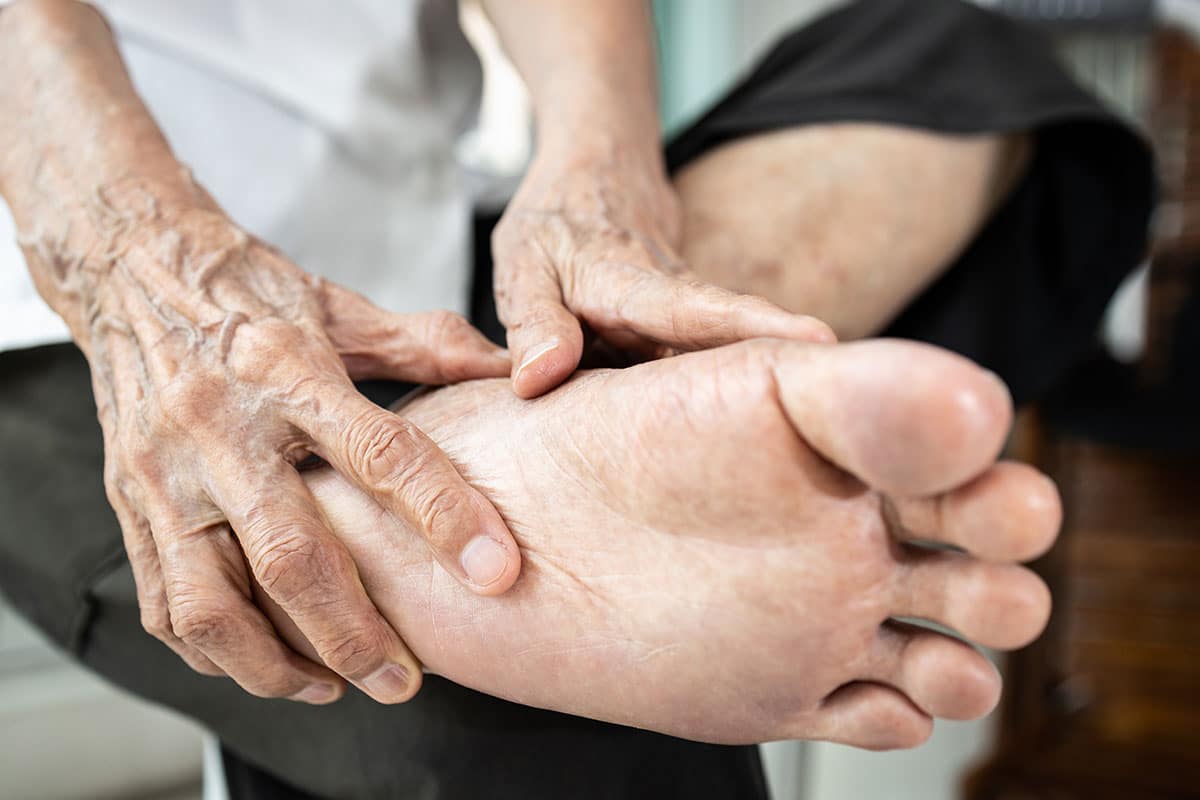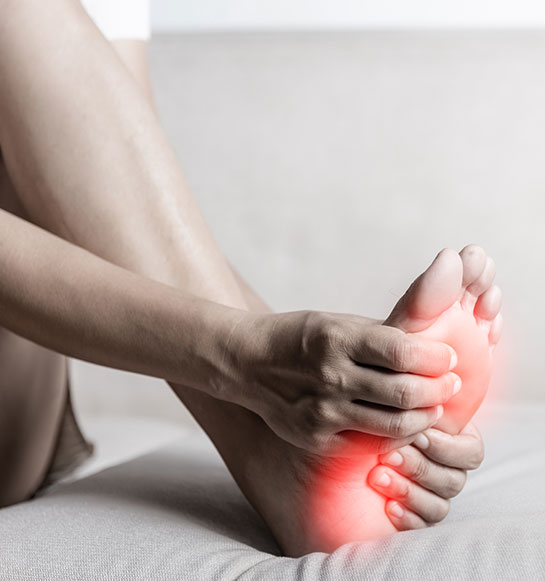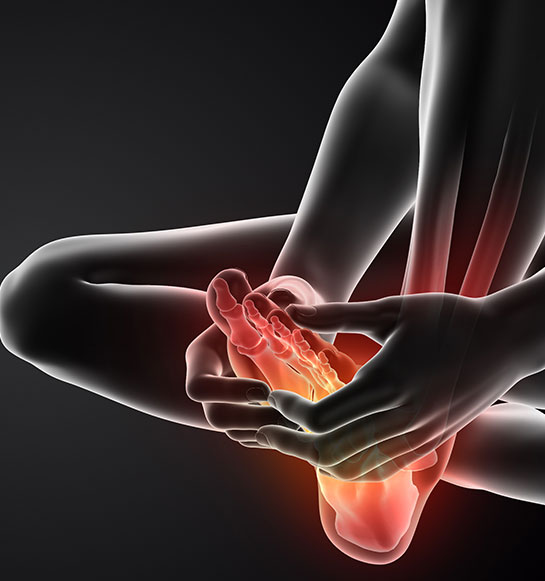Treating Peripheral Neuropathy and Their Limitations
Peripheral Neuropathy, characterized by damage to the body's peripheral nerves, often leads to pain, numbness, and weakness, primarily in the hands and feet. To manage these symptoms, several classes of traditional medications are frequently prescribed. However, while these can provide symptom relief, they also present certain limitations.

Commonly Prescribed Medications:
Pain Relievers
Over-the-counter pain medications are sometimes sufficient for mild symptoms, but more severe cases may require prescription-strength painkillers. Opioids, for instance, may be prescribed for intense pain but are generally avoided due to their high risk of dependence and addiction.
Anticonvulsants
Originally developed to treat epilepsy, anticonvulsant drugs can help manage neuropathic pain by stabilizing nerve cells. Gabapentin and pregabalin are examples that may reduce the pain associated with peripheral neuropathy.
Antidepressants
Certain antidepressants have been found to interfere with the chemical processes in the brain and spinal cord that cause you to feel pain. Tricyclic antidepressants (like amitriptyline, nortriptyline) and serotonin-norepinephrine reuptake inhibitors (like duloxetine) are commonly used.
Topical Treatments
Capsaicin cream and lidocaine patches are examples of topical treatments that may provide localized relief of peripheral neuropathy symptoms.
Limitations of Traditional Medications:
- Side Effects: A significant limitation of these medications is the potential for side effects. Anticonvulsants and antidepressants can cause dizziness, weight gain, fatigue, and blurred vision, among others. The use of opioids carries the risk of addiction, constipation, nausea, and drowsiness.
- Symptom Management Only: These medications primarily address the symptoms rather than the underlying cause of Peripheral Neuropathy. This approach can offer temporary relief but does not halt the progression of the nerve damage.
- Variable Efficacy: Not all patients experience relief from these medications, and their effectiveness can diminish over time. This variability can lead to a trial-and-error approach in finding an effective treatment regimen, which can be frustrating and time-consuming for patients.
- Interaction with Other Medications: Especially in elderly patients or those with multiple health conditions, the risk of interactions between different medications can limit the use of certain drugs for treating peripheral neuropathy.
- Cost and Accessibility: The cost of prescription medications and ongoing medical visits for monitoring and adjustments can be prohibitive for some patients, impacting their ability to adhere to treatment plans.
These treatments function essentially as a temporary cover-up for the symptoms, neglecting to confront the foundational issues at the heart of peripheral neuropathy. Consequently, while they might offer a short-term reprieve from discomfort, they often do not lead to a sustained alleviation of symptoms or a reversal of the neuropathic condition itself. This approach results in a cycle where the underlying causes remain unaddressed, preventing any real progress toward long-term health improvement or the restoration of nerve function.

The Sarasota Diabetes & Neuropathy Center Approach: Personalized, Natural, and Comprehensive
At Sarasota Diabetes & Neuropathy Center, our commitment is to offer more than just temporary relief for those suffering from Peripheral Neuropathy. We understand the profound impact this condition can have on daily life, and our mission is to address it at its source. Our unique approach focuses on identifying and treating the root cause of our patients’ peripheral neuropathy, moving beyond the conventional strategy of simply managing symptoms like high blood sugar levels.
Upon choosing our center, patients embark on a comprehensive journey toward healing. The process begins with an in-depth evaluation, utilizing a variety of laboratory tests and analyses to pinpoint the specific factors contributing to each individual’s peripheral neuropathy. Under the careful guidance of our dedicated medical professionals, each patient receives a customized treatment plan. This plan may include specialized supplementation and other interventions aimed directly at addressing the underlying causes of their condition.
Our proactive and personalized methodology is central to our philosophy. At Sarasota Diabetes & Neuropathy Center, we don’t just aim to manage the symptoms of Peripheral Neuropathy; we strive to improve our patients’ overall health and enhance their quality of life. Through our targeted approach, we’ve seen significant success in reducing our patients’ dependence on medications and helping them return to a life not dictated by neuropathic pain.
Our Approach
Our approach to peripheral neuropathy treatment encompasses a wide range of strategies aimed at addressing the root causes of the condition, thereby providing our patients with the opportunity for lasting relief and potentially reversing the effects of peripheral neuropathy.
Our Advanced Therapeutic Options:
Nerve Regeneration Equipment
Our arsenal includes cutting-edge nerve regeneration machinery, such as laser light therapy and electromagnetic impulse technology. These therapies work by stimulating the nerves, encouraging repair, and fostering the regeneration of nerve tissues. By directly targeting the affected nerves, these treatments can significantly enhance nerve function and reduce symptoms of peripheral neuropathy.
Vaso-Pulse Technology
Leveraging FDA-approved Vaso-Pulse Technology, we offer a sophisticated treatment that sends therapeutic signals through the feet and around the base of the spine. This innovative technology is designed to identify and rectify areas of nerve and vascular damage, thereby improving blood circulation and enhancing nerve function. The use of Vaso-Pulse Technology can lead to notable improvements in symptoms by promoting better blood flow and aiding in the repair of damaged nerves.
In addition to our state-of-the are equipment, we may include:
Utilization of Antioxidants
To counteract oxidative stress and mitigate nerve damage, we incorporate antioxidants into our treatment plans. These substances help protect and repair cells from the damage caused by free radicals, which are often elevated in states of peripheral neuropathy.
Anti-inflammatory Agents
To reduce the inflammation that can exacerbate nerve pain and damage, we recommend anti-inflammatory compounds. Reducing inflammation can help alleviate symptoms and prevent further nerve degradation.
Vitamins and Minerals Supplementation
We address nutritional deficiencies that are known to impact nerve health by supplementing with essential vitamins and minerals, such as B vitamins and alpha-lipoic acid, which play critical roles in nerve function and repair.
Immunomodulators
For neuropathies linked to autoimmune disorders, we employ immunomodulators that help regulate the immune system’s activity to prevent it from attacking the body’s own nerve tissues.
Lifestyle and Dietary Modifications
We advocate for changes in lifestyle, including dietary adjustments and exercise recommendations, to support overall nerve health and enhance the body’s natural healing processes.
Through a personalized, natural, and comprehensive treatment approach that includes both nutraceutical interventions and state-of-the-art therapies, we are committed to not only alleviating the symptoms of peripheral neuropathy but also to tackling its underlying causes. Our goal is to offer our patients a pathway to long-term recovery, aiming for the alleviation and potential reversal of peripheral neuropathy, thereby improving their quality of life.
Approach and Limitations
Conventional treatment for neuropathy often relies on medication management with drugs like gabapentin, pregabalin, or duloxetine. While these medications can help alleviate neuropathy symptoms, they come with a range of potential side effects, including:
- Gabapentin: dizziness, drowsiness, fatigue, peripheral edema
- Pregabalin: dizziness, somnolence, dry mouth, blurred vision
- Duloxetine: nausea, dry mouth, constipation, insomnia, fatigue
These medications merely mask the symptoms without addressing the underlying causes of neuropathy, often failing to provide long-lasting relief or reversal of the condition.

Traditional Approach and Limitations
Conventional treatment for neuropathy often relies on medication management with drugs like gabapentin, pregabalin, or duloxetine. While these medications can help alleviate neuropathy symptoms, they come with a range of potential side effects, including:
- Gabapentin: dizziness, drowsiness, fatigue, peripheral edema
- Pregabalin: dizziness, somnolence, dry mouth, blurred vision
- Duloxetine: nausea, dry mouth, constipation, insomnia, fatigue
The SDNC Approach: Personalized, Natural, and Comprehensive
At Sarasota Diabetes & Neuropathy Center (SDNC), we take a different, more comprehensive approach to treating neuropathy, one that has proven successful in reversing the condition in many cases. Our approach is built on the use of nutraceuticals – targeted supplements and natural treatments that address the unique underlying causes of each individual’s condition.
We understand that neuropathy can stem from various factors, including diabetes, autoimmune disorders, nutritional deficiencies, toxin exposure, and inflammation. Our strategy is specifically catered to the distinct biochemical and physiological imbalances present in each patient, ensuring a personalized approach rather than a one-size-fits-all solution.
Through extensive testing and analysis, we identify the specific factors contributing to each patient’s neuropathy, such as oxidative stress, inflammation, vitamin deficiencies, or autoimmune processes. We then develop a tailored plan that incorporates carefully selected nutraceuticals, designed to target and correct these underlying imbalances.
This methodical and individualized application of nutraceuticals is aimed not just at managing symptoms but fundamentally reversing the course of neuropathy by directly addressing the factors that contribute to its development.
Our approach may include:
- Antioxidants to combat oxidative stress and nerve damage
- Anti-inflammatory compounds to reduce inflammation
- Vitamins and minerals to address deficiencies (e.g., B vitamins, alpha-lipoic acid)
- Immunomodulators for autoimmune-related neuropathy
- Lifestyle modifications, including dietary changes and exercise recommendations
In addition to nutraceuticals, we also employ advanced therapies such as:
- Nerve Regeneration Machinery: This includes laser light therapy and electromagnetic impulses that stimulate nerve repair and regeneration.
- Vaso-Pulse Technology: This FDA-approved technology sends a signal up the feet and around the base of the spine to detect and reverse areas of nerve and vascular damage, improving blood flow and nerve function.

